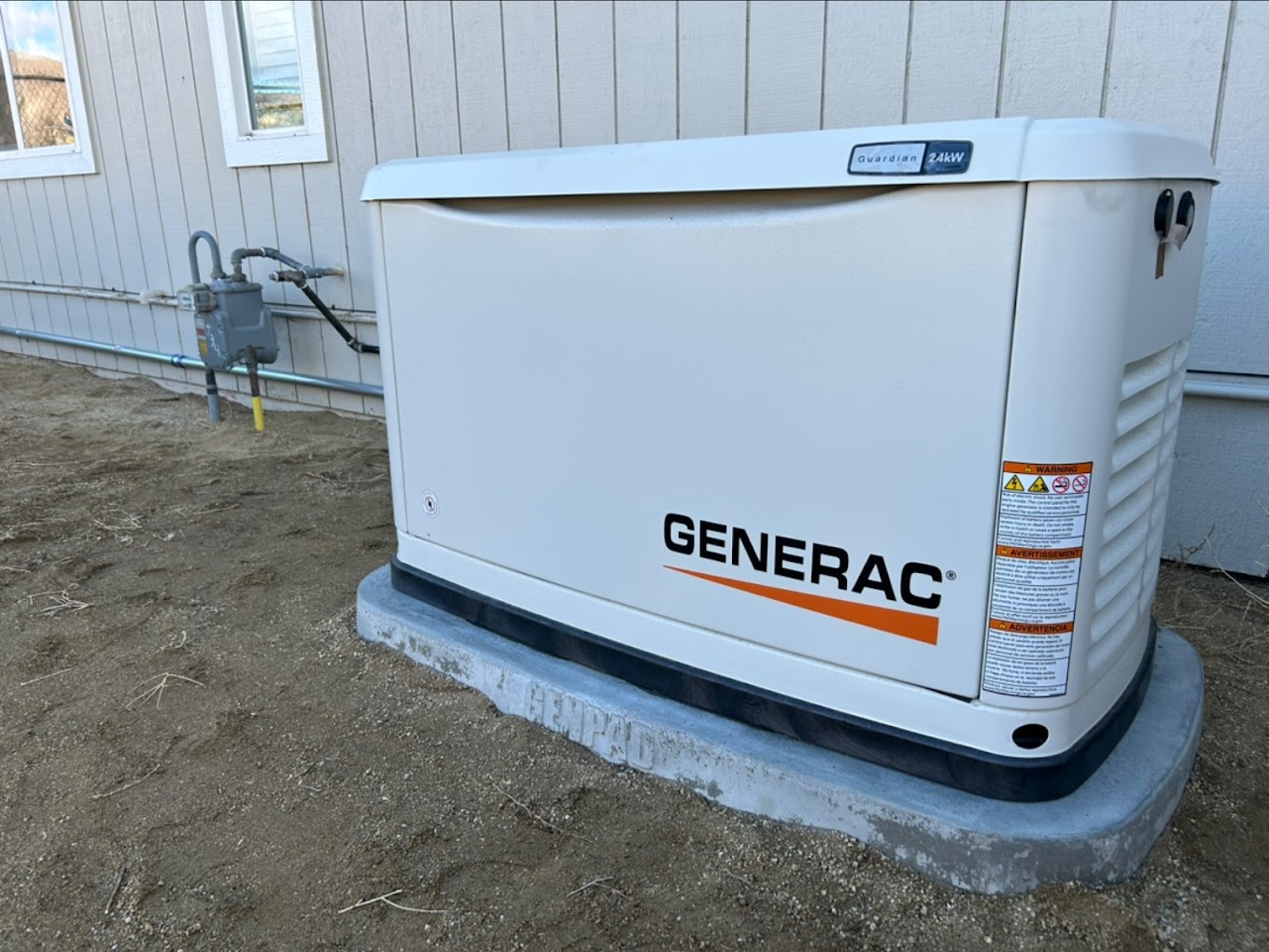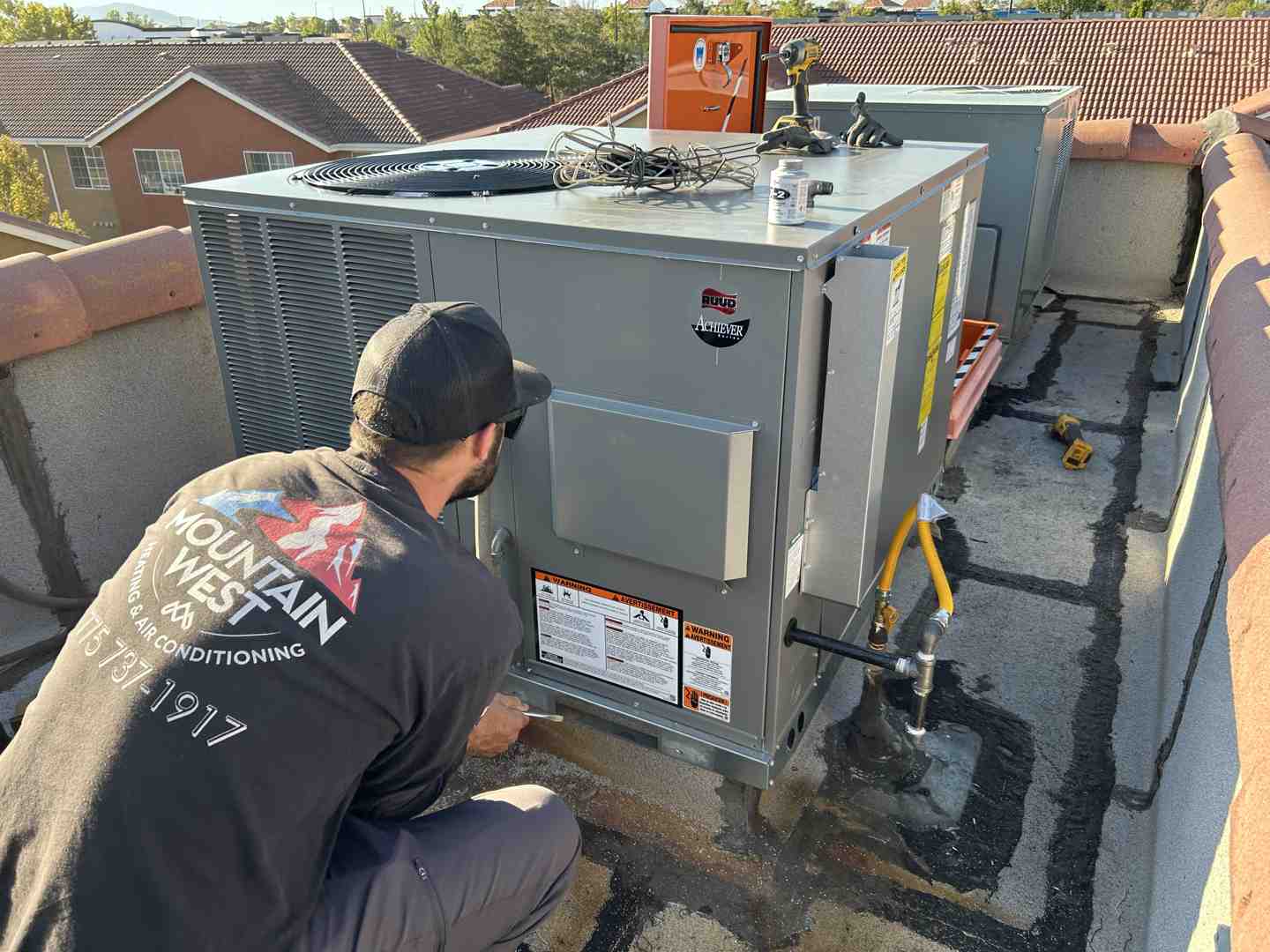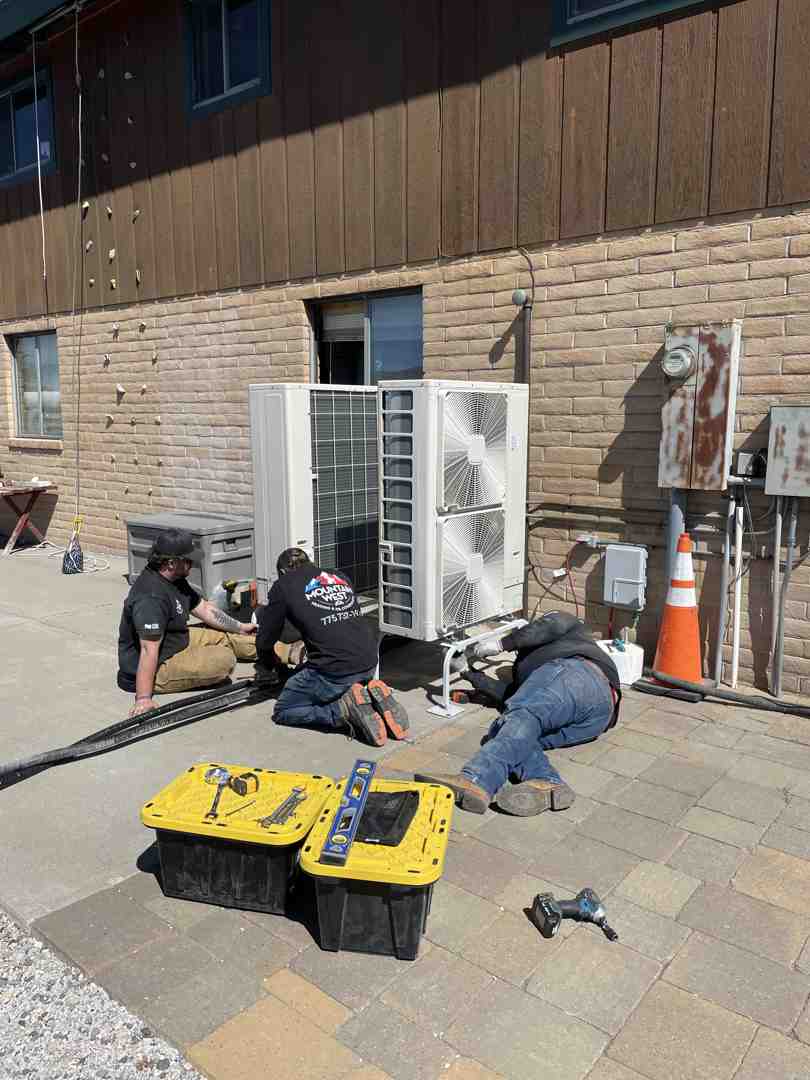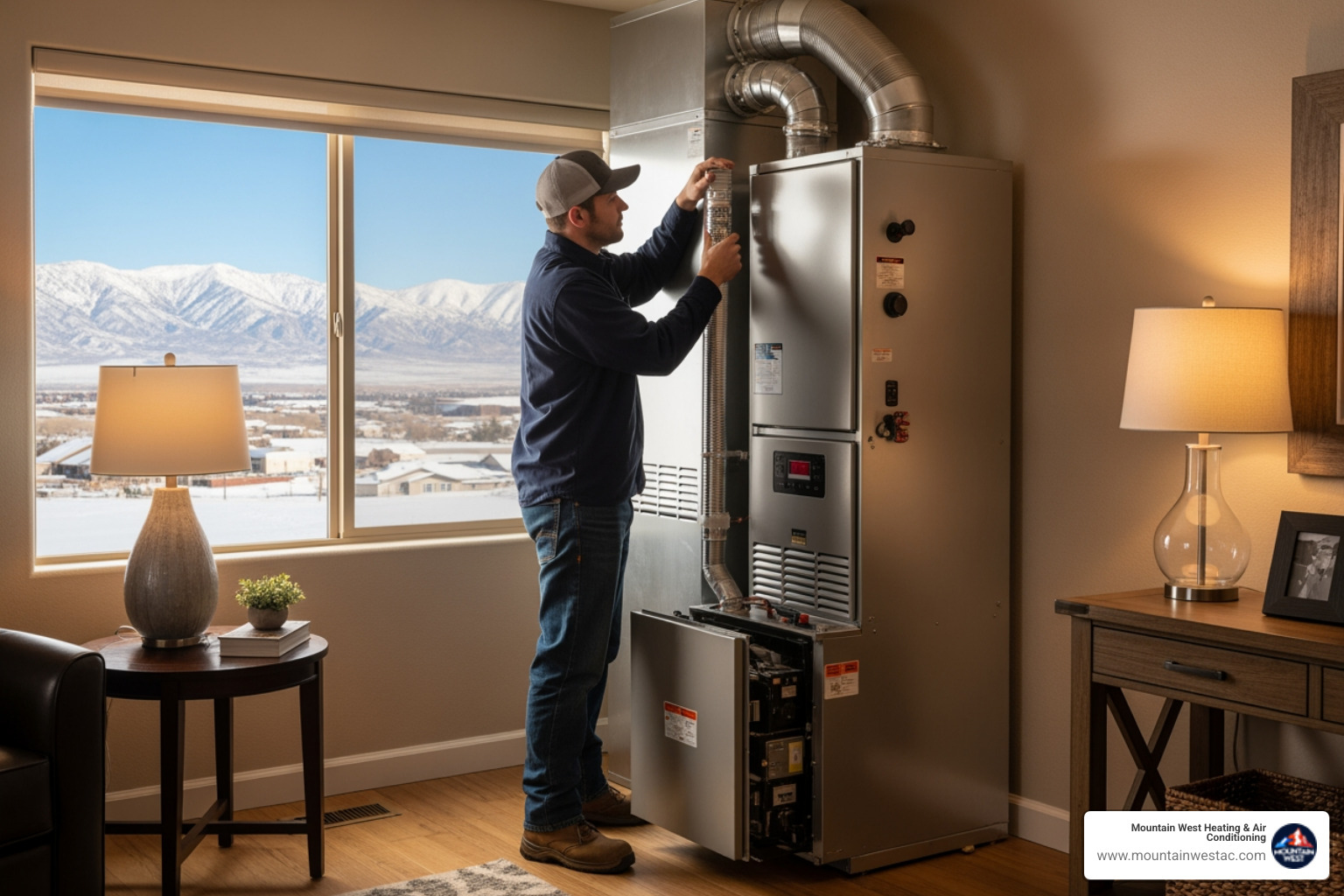Whole house generators come in different sizes and fuel types. Natural gas and propane are popular choices for standby generators. These systems kick in automatically when the power fails, keeping your lights on and your appliances working.
For homes with solar panels, a generator can serve as a backup when solar energy isn't enough.
Nevada residents face hot summers and cold winters that can strain the electrical grid. Residents face hot summers and cold winters that can strain the electrical grid. Power outages are not uncommon, especially during extreme weather events.
A whole-house generator can provide peace of mind and keep your home running smoothly when the power goes out.
A whole house generator can be a smart investment, as it protects your family from the discomfort and potential dangers of prolonged outages. Plus, it keeps your home's systems functioning, preventing issues like frozen pipes in winter or food spoilage in summer.
Whether you’re protecting perishable food, running medical devices, or ensuring your HVAC system stays active, a home standby generator can make the difference between comfort and crisis.
In this article, we’ll cover why whole house generators are especially important in Nevada, how they work, what types are available, and what to consider when choosing, installing, and maintaining the right system for your home.
Here's what you'll see:
- What is a whole house generator and how does it work?
- How Nevada’s extreme weather puts homes at risk
- How to choose the right generator for your Nevada property
- What to expect when installing a generator in Nevada
- How to choose qualified professionals for generator installation in Nevada
Let's dive in!
What is a whole house generator and how does it work?
Whole house generators provide backup power for homes during outages. We'll explore how they work, the different types, and their key benefits.
How does backup power work in Nevada homes?
Whole house generators kick in automatically when the power goes out, connecting to your home's electrical system through an automatic transfer switch. This switch detects outages and starts the generator within seconds. The generator then powers your home's essential circuits. These often include lights, refrigerators, HVAC systems, and medical equipment.
Most whole-home generators run on natural gas or propane, as these fuel sources allow for long run times without refueling. The generator keeps running until power is restored, then shuts off automatically.
Which generator type is best for Nevada’s climate?
There are a few main types of whole-house generators:
- Natural gas generators: Connect to existing gas lines for continuous fuel supply
- Propane generators: Use large tanks that need periodic refilling
- Diesel generators: Offer high power output but require fuel storage
- Solar generators: Use battery banks charged by solar panels
Each type has pros and cons in terms of cost, fuel availability, and power output. The best choice depends on your specific needs and location.
What problems can a standby generator prevent?
Whole house generators offer several key benefits:
- Peace of mind during outages
- Protection for food and medicine
- Ability to run essential medical equipment
- Comfort from working HVAC systems
- Prevent basement flooding by powering sump pumps
- Keep work-from-home setups running
How Nevada’s extreme weather puts homes at risk
Backup power is crucial for Nevada residents. It keeps homes running during outages and protects against extreme weather. Let's look at why it matters.
According to the U.S. Department of Energy, weather-related power outages in the U.S. have risen by 78% between 2000 and 2021, largely due to the increasing severity of climate events.
Nevada, with its extreme temperatures and arid climate, is particularly vulnerable to this trend.
A whole house generator helps homeowners maintain safety, comfort, and continuity when the grid goes down.
Weather-related power outages
Nevada's weather can be harsh. Hot summers and cold winters put stress on the power grid, leading to more blackouts. We see many outages from summer storms and winter ice. These can last for hours or even days. Without power, homes quickly become unsafe.
Backup generators kick in when the grid fails, keeping lights on and appliances running. This is vital in extreme heat or cold.
Air conditioning is a also must in Nevada's scorching summers. Losing it can be dangerous for kids and older adults, and backup power ensures your Air conditioning is a also must in Nevada's scorching summers. Losing it can be dangerous for kids and older adults, and backup power ensures your Support for essential home systems
Many Nevada homes rely on electric-powered systems and these need to work non-stop. Refrigerators and freezers need constant power as food spoils quickly in Nevada's heat. Generators prevent food waste and save money.
Some areas use well water, no power means no water for drinking or cleaning. Generators ensure a steady water supply. Medical equipment is also critical for some residents, as things like oxygen machines can't stop working.
Meanwhile, sump pumps protect basements from flooding, if they stop, homes can suffer water damage.
How to choose the right generator for your Nevada property
Picking a whole-house generator requires careful thought. Let’s consider the key factors when making this important choice for your Nevada home.
Evaluating power needs and generator size
You need to figure out how much power our home uses, as this helps you choose the right size generator. Make a list of essential appliances and their wattage, and don't forget medical equipment, air conditioning, and other must-haves.
Add up the wattages to get your total power needs. A typical home might need 5,000 to 7,000 watts, but your needs could be different. Larger homes or those with more appliances may need 10,000 watts or more, so it's best to get a generator with some extra capacity.
Understanding fuel options and availability
Whole house generators can run on different fuels:
Natural gas is often the cheapest and most convenient. It connects to your home's gas line, but not all areas have natural gas service.
- Propane is stored in tanks on your property and is a good choice if you don't have natural gas. You'll need to refill the tanks periodically.
- Diesel generators are powerful but can be noisy. They need regular fuel deliveries or a large on-site tank.
Think about which fuel is easy to get in your area, as this can affect your long-term costs and convenience.
Pros and cons of various generator models
Standby generators start automatically when power goes out. They're convenient but cost more upfront. Installation is also complex and needs a professional. Alternatively, portable generators are cheaper and more flexible, but they're less powerful and need manual setup. You also have to store fuel safely.
Some key things to compare:
- Power output
- Fuel efficiency
- Noise level
- Warranty
- Brand reputation
Look for models with good reviews from trusted sources like Consumer Reports, and compare features and prices from different brands. Remember to factor in installation and maintenance costs. A cheaper generator might cost more in the long run if it needs frequent repairs.
What to expect when installing a generator in Nevada
Proper installation and upkeep are crucial for whole-house generators in Nevada. These steps ensure safety and optimal performance during power outages.
Safe installation procedures
We recommend hiring a licensed electrician for a generator installation. They'll choose a suitable outdoor location at least 5 feet from your home, ensuring good airflow to prevent carbon monoxide buildup.
The electrician will install a transfer switch to connect the generator to your home's electrical panel. This switch is vital for safety. It stops power from flowing back into utility lines.
Permits are often needed before installation, and you’ll need to check with your local building department. The process may take a few weeks to complete and your electrician can assist.
Regular maintenance for peak performance
We suggest servicing your generator yearly or after 200 hours of use. Change the oil, filters, and spark plugs as needed, Check fuel lines for leaks, tighten loose connections, and test your generator monthly. Let it run for 10-15 minutes to keep parts lubricated. This also helps spot issues before an emergency.
Keep the area around your generator clear, removing debris, snow, and ice. This prevents damage and ensures proper airflow. Also, store extra oil and filters on hand for quick maintenance. Always follow the manufacturer's guidelines for best results.
How to choose qualified professionals for generator installation in Nevada
Installing a whole house generator isn’t just about buying the right equipment, it’s about making sure the job is done safely, legally, and effectively.
Nevada has specific regulations for electrical and gas work, and the complexity of standby generator systems means that hiring the right professionals is critical. Here’s what homeowners need to know when selecting a contractor for installation and maintenance.
Licensing, regulations, and local expertise you should look for
In Nevada, generator installation must comply with both state and local codes, which means working with a licensed contractor is not optional, it’s required.
Always verify that the professional holds an active Nevada Contractor’s License (classification C-2 for electrical work or C-21 for refrigeration and air-conditioning, when applicable). You can check credentials directly through the Nevada State Contractors Board.
Beyond licensing, choose professionals with specific experience in standby generator systems. Look for companies that:
- Are familiar with permitting procedures in your municipality (e.g., Clark County, Washoe County, or Carson City)
- Understand local zoning and setback requirements for generator placement
- Offer load assessment services to properly size your generator for your home’s needs
- Can coordinate gas line work (with a licensed plumber, when applicable) and utility company approvals
- Provide ongoing maintenance plans, which are essential to keep the generator operating safely and efficiently year-round
Don’t hesitate to ask for proof of insurance, references from past clients, and written estimates that outline not only the equipment and installation costs but also the expected timeline, testing procedures, and post-installation support.
Why Nevada homeowners trust Mountain West for standby generator installation
Choosing the right generator is only part of the equation, choosing the right installer is what ensures safety, performance, and long-term reliability.
Mountain West isn’t just a regional HVAC contractor; we’re a fully licensed electrical and generator installation specialist serving homeowners across Nevada. Our deep familiarity with local building codes, harsh climate conditions, and permitting processes makes us uniquely equipped to deliver generator systems that are properly sized, safely installed, and ready for long-term operation.
Whether you’re in the Las Vegas Valley, Reno, or a rural area where outages last longer and fuel access is limited, our team builds solutions that fit your site, utility access, and daily power needs. From system design to post-installation maintenance, Mountain West ensures your generator is more than just a backup, it’s a fully integrated part of your home’s infrastructure.
Code-compliant installation from a Nevada-licensed electrical team
Installing a whole house generator in Nevada isn’t just about power, it’s about meeting strict regional codes, securing proper permits, and ensuring long-term safety. Mountain West is a fully licensed and insured electrical contractor, with deep experience navigating local ordinances in counties like Clark, Washoe, and Carson City.
We handle every technical detail: performing electrical load calculations, determining generator placement that meets setback and airflow requirements, coordinating with gas utilities, and submitting all necessary permit applications.
Our installations include a code-rated transfer switch and connection to your main panel, ensuring your generator activates instantly and safely during any outage.
Because Nevada’s climate brings temperature extremes and elevation challenges, we install only proven systems rated for the region, and back them with structured maintenance to keep them running long after the lights go out.
Flexible financing options for Nevada homeowners
A whole-house generator is a serious investment, but that doesn’t mean it has to be financially out of reach. At Mountain West, we offer affordable financing through Synchrony, including 18-month, no-interest plans on qualifying installations. This allows Nevada homeowners to secure reliable backup power without paying the full amount upfront.
The dry climate and aging grid infrastructure across Nevada make generators more of a necessity than a luxury, especially in areas where summer outages can last days. Our financing options are built to reflect this urgency, enabling families to act quickly while keeping monthly payments predictable and interest-free.
Applying is fast and handled entirely online via our Financing page, and we’re happy to walk you through how your approval impacts system selection. Whether you’re financing a full Generac install or bundling additional electrical work, we’ll help you build a plan that works for your home and budget.
Get a real-time estimate based on your home's needs
If you’re comparing generator options in Nevada, you shouldn’t have to wait days for a quote, or guess how much it’ll cost per month. Mountain West’s Estimate Builder gives you instant, tailored pricing based on your home’s size, layout, and electrical needs.
This tool does more than give a general price range. It calculates your lowest monthly financing option using real-world data tied to your selected system. Whether you’re evaluating fuel types, capacity, or installation complexity, you’ll get a transparent estimate that reflects what you’d actually pay with financing.
Nevada’s housing stock varies, from compact urban homes to large desert estates, so having a personalized estimate ensures you're not over- or under-sizing your system. It’s the best way to plan smart and move forward with clarity, especially when time-sensitive outages are on the horizon.
Conclusion
Power interruptions are no longer rare or short-lived, especially in states like Nevada, where aging infrastructure and harsh weather create the perfect conditions for blackouts. Whether it’s a desert heatwave or a winter storm, losing power can put your home, comfort, and even health at risk.
Installing a whole house generator isn’t just a reactive measure, it’s a proactive investment in year-round resilience. It keeps your essential systems running, protects your appliances and electronics, and ensures that your home stays livable no matter what’s happening outside.
If you live in Nevada and want to future-proof your property against outages, consider speaking with a professional about the right whole house generator setup. The peace of mind that comes with uninterrupted power is worth it, especially when the next outage isn’t a matter of if, but when.
Get in touch to discuss the benefits of a whole-home generator to protect your property from outages.









